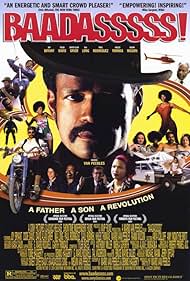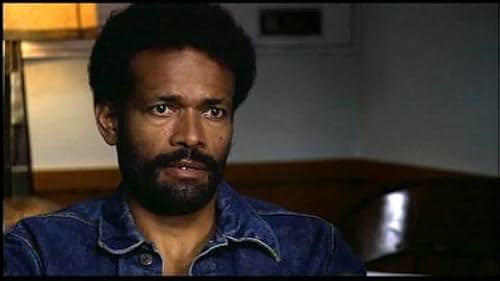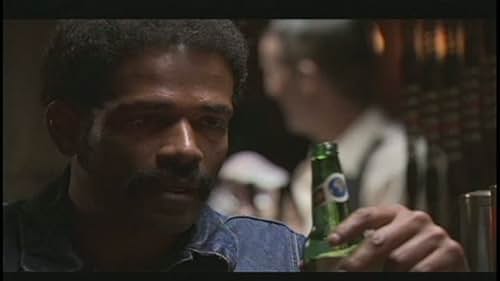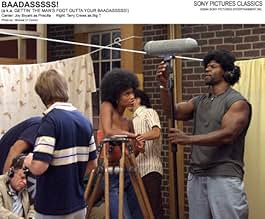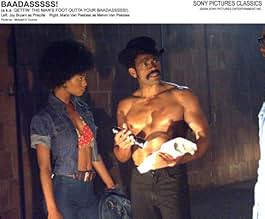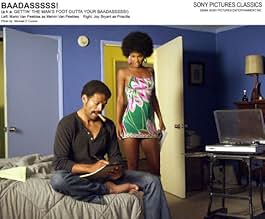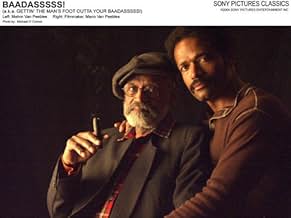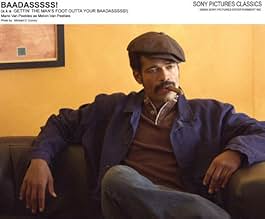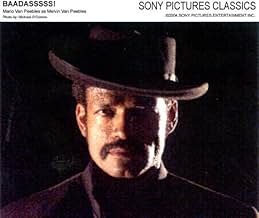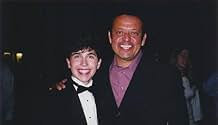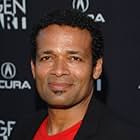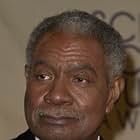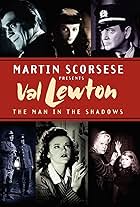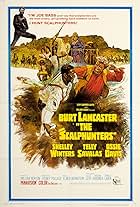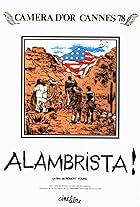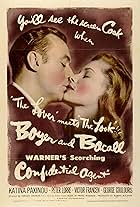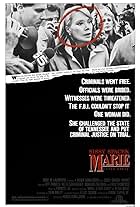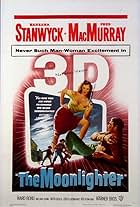IMDb RATING
7.3/10
5.3K
YOUR RATING
Mario Van Peebles' half-documentary/half-homage to his father Melvin Van Peebles' movie Sweet Sweetback's Baadasssss Song (1971).Mario Van Peebles' half-documentary/half-homage to his father Melvin Van Peebles' movie Sweet Sweetback's Baadasssss Song (1971).Mario Van Peebles' half-documentary/half-homage to his father Melvin Van Peebles' movie Sweet Sweetback's Baadasssss Song (1971).
- Awards
- 3 wins & 11 nominations
Ralph P. Martin
- Tommy David
- (as Ralph Martin)
- Director
- Writers
- All cast & crew
- Production, box office & more at IMDbPro
Storyline
Did you know
- TriviaDuring a July 2004 interview with Terry Gross on the National Public Radio program "Fresh Air," Mario Van Peebles explained that he did not want to put any child actor in the same position he was put in on the set of Sweet Sweetback's Baadasssss Song (1971), especially because he felt like, as a thirteen-year-old, his father had given him no choice but to participate in a sex scene with a much older woman--partly by threatening to confiscate the bicycle he had received as a Christmas present if he didn't perform. "I didn't enjoy it at all. I didn't want to be in that scene. I didn't want to have to give that bike back--that bike had a banana seat!...I didn't want to make anyone do that scene twice, so in How to Get the Man's Foot Outta Your Ass (2003) I just used the original footage of me as a kid in "(Sweet) Sweetback('s Baadasssss Song)" during that scene. So the kid I cast (to play the younger version of me, Khleo Thomas) wasn't going to have to do anything like that. And that's just something that I wanted to do--I said, 'well, I'm not going to repeat, do unto someone else what I didn't like having done unto me. ' But I did want to show the scene because I thought it was a point in my life, and it just showed something interesting about Melvin, that he was sort of like that 'Great Santini-esque' father--almost that which does not kill in a Friedrich Nietzsche-esque way you makes you stronger."
- GoofsWhile in the "D"...Detroit, The DJ announces the radio station's call letters beginning with "K" Call letters for radio and television stations in that area of the country start with "W".
- Quotes
Melvin Van Peebles: Is this something negative, Priscilla? Because if it's negative, I can't even deal with it right now. I'm a broke, pissed off nigger from Chicago, and I'm down to my last cigar.
- Crazy creditsReal-life participants of the production of "Sweet Sweetback's..." give testimony during the closing credits, including Earth, Wind & Fire founding member Maurice White, who confirmed the "bounced check" story. Melvin Van Peebles himself appears onscreen when the credits finish.
- ConnectionsFeatured in Anatomy of a Scene: Baadasssss (2004)
- SoundtracksDamn All the Fallacies
Performed by Tree Adams
New Dog Old Trix Publishing
Written by (c) Adam Hirsh
Courtesy of Treehouse Music Inc.
Featured review
There have been many movies, usually bittersweet comedies, about movie-making with the director as the put-upon ringmaster of eccentrics, like Truffaut's "Day for Night" or "Living in Oblivion," or bio-pics that show the director as eccentric visionary, like "Ed Wood" or "Matinee."
But I think "Baadasssss!" is one of very few to show the filmmaker as a driven artist, more comparable to the intense look at a ground-breaking creator like "Pollock."
Writer/director/producer Mario Van Peebles eerily reenacts how his father Melvin wrote/directed/produced the seminal "Sweet Sweetback's Baad Asssss Song," one of the first indie movies that also virtually created the potent blaxpoitation genre and guerrilla moviemaking; I thought I had seen it back in '71, but as soon as this film started I realized my memory was, embarrassingly, confusing it with Robert Downey Sr.'s "Putney Swope," so now I do need to see the original.
The production design, including costumes and hair styles, exquisitely recreates the era, but the editing and cinematography suck us even further into Melvin's head as he incisively surveys the state of the image of blacks in movies up to that time and story boards his response.
Melvin's obsession to create and complete the film according to his vision and on his terms threatens his health and his personal and business relationships, but we are caught up in his whirlwind and root for him no matter how ruthless and prickly he becomes as the odds get ever longer and more frustrating and he refuses to compromise, taking offense at lame, well-meaning suggestions, for example, that he might get further if he would at least smile. But he everywhere, rightly or overly sensitively, only sees racism and condescension, including when he has to part layers of irony to beg Bill Cosby for help.
Recalling the spirit of Werner Herzog's documentary "My Best Fiend" about his tortured collaboration with Klaus Kinski to portray obsessives in "Fitzcarraldo" and "Aguirre: The Wrath of God," Mario adds layers of Freudian issues as this filial tribute unflinchingly includes the father's treatment of the son on set and off in the original film and unsparingly brings to life everyone around them.
Mario effectively borrows other bio-pic techniques, such as the camera-facing interviewees in "Reds," first by their portrayers, then, next to the closing credits, the real people, concluding with a loving portrait of his father.
Contrary to the original film, which boosted the careers of the fledging Earth, Wind, and Fire, the soundtrack instrumentation here is surprisingly traditional and sentimental.
The Portrait of the Artist can rarely be a Portrait of a Nice Guy and "Baadasssss!" beautifully and honestly shows why.
But I think "Baadasssss!" is one of very few to show the filmmaker as a driven artist, more comparable to the intense look at a ground-breaking creator like "Pollock."
Writer/director/producer Mario Van Peebles eerily reenacts how his father Melvin wrote/directed/produced the seminal "Sweet Sweetback's Baad Asssss Song," one of the first indie movies that also virtually created the potent blaxpoitation genre and guerrilla moviemaking; I thought I had seen it back in '71, but as soon as this film started I realized my memory was, embarrassingly, confusing it with Robert Downey Sr.'s "Putney Swope," so now I do need to see the original.
The production design, including costumes and hair styles, exquisitely recreates the era, but the editing and cinematography suck us even further into Melvin's head as he incisively surveys the state of the image of blacks in movies up to that time and story boards his response.
Melvin's obsession to create and complete the film according to his vision and on his terms threatens his health and his personal and business relationships, but we are caught up in his whirlwind and root for him no matter how ruthless and prickly he becomes as the odds get ever longer and more frustrating and he refuses to compromise, taking offense at lame, well-meaning suggestions, for example, that he might get further if he would at least smile. But he everywhere, rightly or overly sensitively, only sees racism and condescension, including when he has to part layers of irony to beg Bill Cosby for help.
Recalling the spirit of Werner Herzog's documentary "My Best Fiend" about his tortured collaboration with Klaus Kinski to portray obsessives in "Fitzcarraldo" and "Aguirre: The Wrath of God," Mario adds layers of Freudian issues as this filial tribute unflinchingly includes the father's treatment of the son on set and off in the original film and unsparingly brings to life everyone around them.
Mario effectively borrows other bio-pic techniques, such as the camera-facing interviewees in "Reds," first by their portrayers, then, next to the closing credits, the real people, concluding with a loving portrait of his father.
Contrary to the original film, which boosted the careers of the fledging Earth, Wind, and Fire, the soundtrack instrumentation here is surprisingly traditional and sentimental.
The Portrait of the Artist can rarely be a Portrait of a Nice Guy and "Baadasssss!" beautifully and honestly shows why.
- How long is Baadasssss!?Powered by Alexa
Details
Box office
- Gross US & Canada
- $365,727
- Opening weekend US & Canada
- $45,331
- May 30, 2004
- Gross worldwide
- $365,727
- Runtime1 hour 49 minutes
- Color
- Sound mix
- Aspect ratio
- 1.85 : 1
Contribute to this page
Suggest an edit or add missing content

Top Gap
By what name was How to Get the Man's Foot Outta Your Ass (2003) officially released in India in English?
Answer